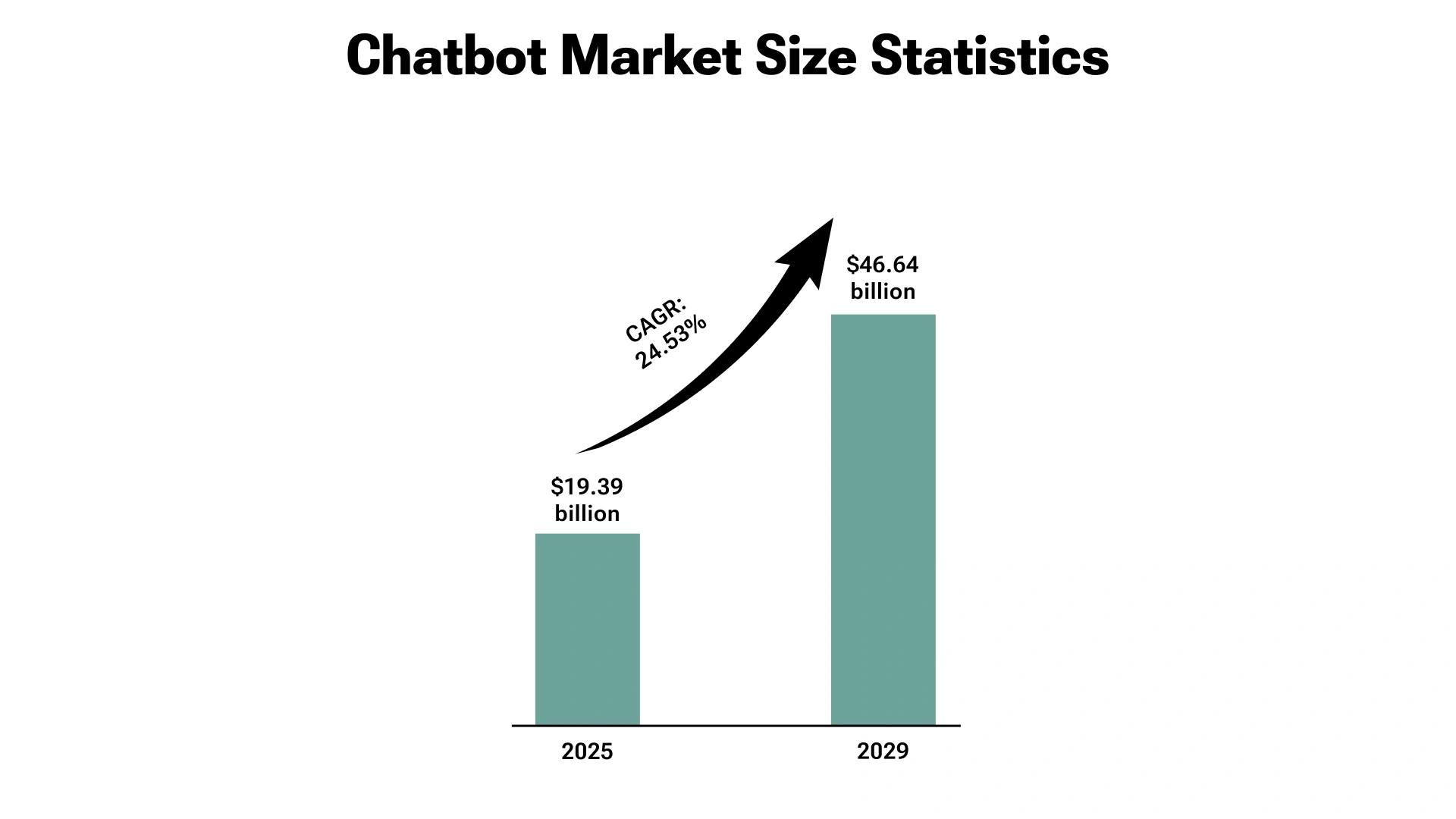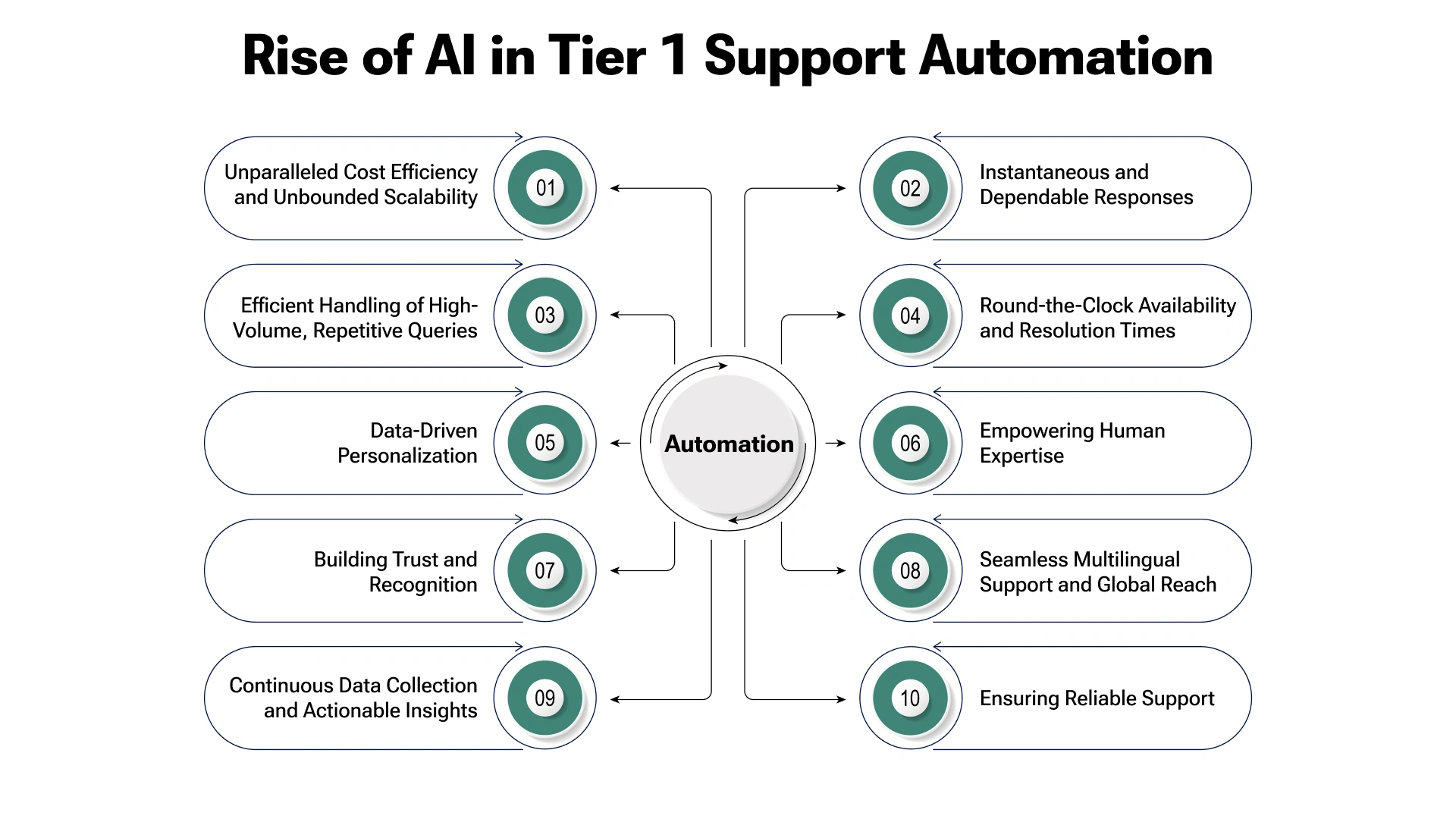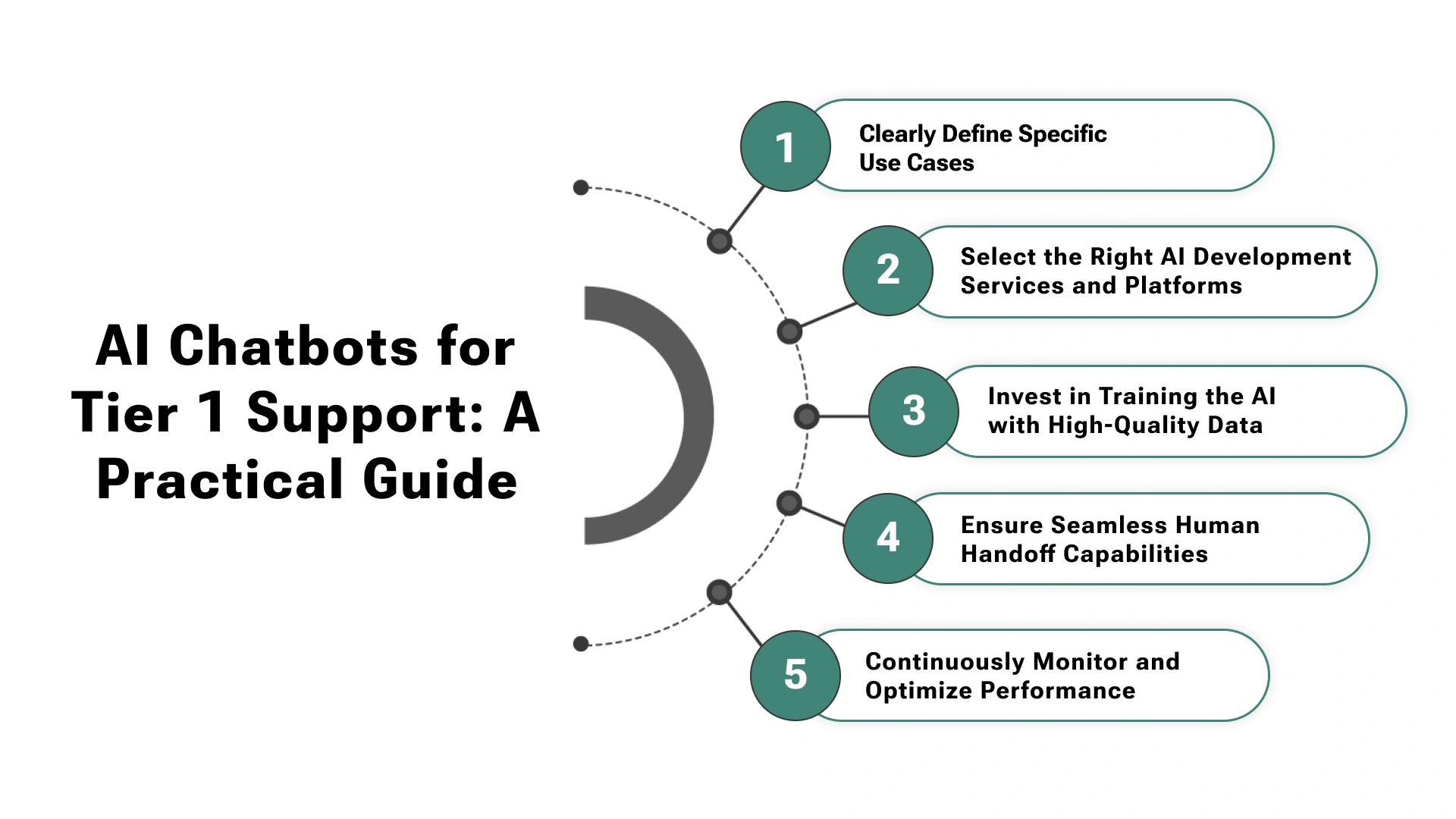Forget incremental improvements; the customer service landscape is undergoing a seismic, irreversible upheaval. Spearheading this dramatic transformation is the meteoric rise of AI chatbot customer service, fundamentally rewriting the rules of engagement for routine inquiries.
We're witnessing a powerful Tier 1 customer service automation wave, empowering forward-thinking companies across e-commerce, SaaS, and countless other industries to embrace sophisticated AI customer support chatbots. The driving forces are undeniable: turbocharging efficiency, slashing operational costs like never before, and delivering lightning-fast response times that today's customers demand.

And the impact is already being felt. Industry analyses reveal that cutting-edge AI-powered customer service tools can autonomously resolve up to a jaw-dropping 80% of routine queries. Imagine the liberation—human agents, freed from the daily grind of repetitive tasks, can now focus their energy on complex, high-value interactions that require a human touch. This isn't just about efficiency; it translates directly into substantial financial gains, with businesses reporting impressive reductions in operational costs ranging from 30% to 40%.
This comprehensive blog isn't just another overview; it's a deep dive into the compelling, data-backed reasons why AI in Tier 1 customer service has become an absolute necessity in today's competitive landscape. We'll meticulously dissect the multifaceted benefits of AI chatbots for businesses, illuminating how these intelligent virtual assistants are no longer a futuristic fantasy but a mission-critical tool for survival and growth.
Let’s start!
Why AI Chatbots Are Spearheading the Replacement of Human Agents
Artificial Intelligence's increasing sophistication and capabilities are no longer confined to science fiction. AI chatbots are emerging as a transformative force in the practical domain of customer service, particularly for handling the high volume of routine Tier 1 queries. Their ability to handle repetitive tasks efficiently, provide instant responses, and operate around the clock drives a significant shift in how businesses approach customer support.
This technological evolution presents a compelling case for the widespread adoption of AI chatbots, offering many advantages that traditional human-centric models often struggle to match.
Let's delve deeper into the key reasons fueling this paradigm shift.

1. Unparalleled Cost Efficiency and Unbounded Scalability
Maintaining a large human support team carries a significant financial burden. Salaries, comprehensive training programs, and the necessary infrastructure investments accumulate rapidly, impacting the bottom line. In stark contrast, AI customer service chatbots offer the undeniable advantage of 24/7 availability while operating at a mere fraction of the cost of human personnel.
Consider the notable example of Bank of America’s AI assistant, Erica, which has successfully managed an astounding 1.5 billion interactions, resulting in monumental savings in staffing expenditures. Similarly, Lyft reported a remarkable 87% reduction in resolution times following the strategic deployment of AI-driven support solutions.
A key differentiator lies in scalability. Unlike human agents, whose capacity is inherently limited, AI-enabled chatbots can scale effortlessly and instantaneously during periods of peak demand without the need for extensive and time-consuming recruitment and training processes. This inherent scalability ensures consistent service quality, regardless of fluctuations in customer inquiry volume.
2. Instantaneous and Dependable Responses
Despite their best efforts, human support agents are susceptible to fatigue and variations in performance, potentially leading to inconsistencies in service delivery. AI customer service bots, however, operate on a foundation of structured databases, ensuring the provision of uniform and consistently accurate responses every single time.
Statistics highlight the growing customer preference for AI-driven interactions. 72% of customers prefer AI-driven chat over the often-extended waiting times associated with reaching a human agent. Moreover, AI chatbots inherently eliminate human errors, such as misinterpreting company policies or omitting crucial troubleshooting steps, thereby enhancing the reliability and accuracy of customer support.
3. Efficient Handling of High-Volume, Repetitive Queries
A high volume of routine and repetitive tasks characterizes the domain of Tier 1 customer service automation. These include essential but time-consuming activities such as:
- Password resets
- Order tracking inquiries
- Addressing frequently asked questions (FAQs)
- Providing updates on refund statuses
By strategically offloading these predictable and recurring tasks to sophisticated AI customer support chatbots, businesses can liberate their human agents to focus their expertise and empathy on more complex, nuanced, and ultimately higher-value customer interactions. This strategic allocation of resources enhances efficiency and improves overall job satisfaction among human support staff.
4. Round-the-Clock Availability and Resolution Times
Unlike human support teams, whose availability is constrained by work schedules and time zones, AI chatbots for customer service operate tirelessly, 24 hours a day, 7 days a week. This continuous availability significantly reduces customer wait times, a critical factor in maintaining customer satisfaction in today's fast-paced digital world.
Consider the compelling statistic that 69% of customers prefer the immediacy of AI responses over the potential delays associated with human assistance. E-commerce giants like Amazon have successfully leveraged the power of AI to manage millions of customer queries daily without compromising on speed or efficiency, setting a benchmark for responsiveness in the industry.
5. Data-Driven Personalization
Advanced AI-powered customer service tools possess the remarkable ability to analyze vast amounts of historical customer interaction data. This analytical capability enables them to gain deep insights into individual customer preferences and behaviors, paving the way for highly personalized recommendations and support.
A prime example is Sephora’s chatbot, which intelligently suggests beauty products to customers based on their purchase history and browsing patterns. Furthermore, the best customer service chatbots in Tier 1 customer service can proactively identify potential issues, such as impending cart abandonment on an e-commerce site, and offer timely and relevant solutions or assistance, enhancing the overall customer journey and driving conversions.
6. Empowering Human Expertise
The automation of routine Tier 1 inquiries by AI-enabled chatbots acts as a powerful catalyst for boosting the productivity of human support agents. By effectively filtering out the high volume of repetitive questions, AI allows human agents to concentrate on more intricate and demanding customer issues that necessitate critical thinking, nuanced problem-solving capabilities, and higher emotional intelligence.
This strategic reallocation of human capital enhances overall operational efficiency. It empowers agents to engage in more meaningful and impactful customer interactions, leading to greater job satisfaction and a higher quality of support for complex cases that require human expertise and empathy.
7. Building Trust and Recognition
Deploying chatbot customer service guarantees a consistent and unified brand voice and messaging across all Tier 1 customer interactions. Unlike human agents, who may exhibit subtle variations in their communication styles and interpretations of brand guidelines, AI chatbots adhere strictly to pre-programmed scripts and brand parameters.
This unwavering consistency is paramount in building and maintaining brand trust. It ensures that every customer interaction reinforces the company's values, policies, and overall brand identity. This uniformity across all customer touchpoints strengthens brand recognition and fosters a cohesive customer experience, regardless of the time, channel, or specific query.
8. Seamless Multilingual Support and Global Reach
Many advanced AI customer support chatbots have sophisticated natural language processing capabilities that enable them to handle customer inquiries in multiple languages concurrently and seamlessly. This eliminates the often complex and costly requirement of maintaining a large and diverse team of human agents proficient in various languages.
By offering multilingual support, businesses can significantly expand their reach to a global customer base, breaking down language barriers and enhancing accessibility for international users. An AI chatbot's ability to instantly switch between languages based on the customer's preference improves efficiency and demonstrates a commitment to inclusivity and superior customer experience for a diverse audience.
9. Continuous Data Collection and Actionable Insights
Every interaction an AI customer service bot handles generates valuable data points. This data, encompassing query types, resolution times, customer sentiment, and more, can be systematically collected, meticulously analyzed, and transformed into actionable insights. By identifying recurring trends, pinpointing common customer pain points, and evaluating the effectiveness of current support processes, businesses can leverage this data-driven intelligence to continuously optimize their support strategies, refine their product offerings, and proactively address potential customer issues.
This data collection, analysis, and implementation cycle fosters a culture of continuous improvement, ensuring that the customer support function evolves and adapts to meet the ever-changing needs of the customer base.
10. Ensuring Reliable Support
As previously highlighted, AI chatbots inherently minimize the potential for human error that can arise from agent fatigue, inadequate training, or misinterpretation of complex information. By drawing directly from meticulously curated and consistently updated knowledge bases and adhering to pre-defined and rigorously tested workflows, AI chatbots ensure a significantly higher degree of accuracy in the information and solutions provided to customers.
This reliability is crucial in building customer confidence, reducing the likelihood of escalations stemming from incorrect guidance, and fostering a perception of competence and trustworthiness in the brand's customer support operations. The consistent accuracy of AI chatbots contributes directly to a more positive and efficient customer experience.
Industries at the Forefront of the AI Customer Support Revolution
The transformative power of AI chatbot customer service is not confined to a select few sectors. A diverse range of industries is recognizing the immense potential of AI to revolutionize their customer interactions, streamline support processes, and ultimately enhance customer satisfaction.
1. E-Commerce: Streamlining the Online Shopping Experience
The e-commerce sector has been an early and enthusiastic adopter of AI chatbot customer service. Leading online retailers are leveraging this technology to enhance various aspects of the customer journey:
- H&M’s AI chatbot adeptly handles tasks such as order tracking, processing returns, and even providing personalized fashion advice, significantly alleviating the workload on human customer service representatives.
- Amazon’s AI-driven support system automates various inquiries, including refund processing and order status updates, resulting in substantial cost savings and improved efficiency.
2. SaaS & Tech Support: Providing Instant Technical Assistance
In the Software-as-a-Service (SaaS) and broader technology support landscape, AI-enabled chatbots for customer service play a crucial role in providing immediate assistance with common technical issues and account management:
- These intelligent chatbots effectively resolve software troubleshooting steps, manage subscription inquiries, and guide new users through onboarding, ensuring a smoother and more efficient experience.
- Zendesk’s AI solutions have demonstrated their effectiveness by reducing support ticket volume by a remarkable 40%, highlighting the significant impact of AI on streamlining tech support operations.
3. Banking & Finance: Enhancing Security and Convenience
The banking and finance industry is increasingly turning to AI to enhance both customer convenience and security:
- Chatbots are making banks smarter. For example, Bank of America’s Erica is a versatile AI assistant that assists customers with tasks such as checking account balances, providing timely fraud alerts, and even offering basic financial advice, all within a secure and user-friendly interface.
- AI chatbots in fintech play a critical role in bolstering security by detecting anomalies in financial transactions in real time. They thereby mitigate fraud risks and safeguard customer assets.
4. Healthcare & Telecom: Improving Accessibility and Efficiency
Even in traditionally human-centric industries like healthcare and telecommunications, AI chatbots are finding valuable applications:
- Healthcare chatbots are being deployed to schedule patient appointments, provide initial symptom assessments, and offer general health-related information, improving accessibility and reducing the administrative burden on healthcare professionals.
- Telecom providers are leveraging AI to proactively alert customers about potential network issues or service disruptions, enhancing customer communication and minimizing frustration.
5. Travel & Hospitality: Elevating the Customer Journey
The travel and hospitality industry is increasingly leveraging AI chatbots to enhance various stages of the customer journey, from initial booking inquiries to post-stay support:
- Hotel chains are deploying chatbots to handle reservation inquiries, provide information about amenities, and offer personalized recommendations for local attractions and dining options.
- Airlines utilize AI chatbots to assist with flight booking changes, baggage tracking, and providing real-time updates on flight status. This significantly improves the passenger experience and reduces the strain on human customer service AI chatbot agents during peak travel times. These chatbots can also offer proactive assistance, such as suggesting alternative flights in case of delays or cancellations, further enhancing customer satisfaction and loyalty.
A Practical Guide: How to Seamlessly Integrate an AI Chatbot for Tier 1 Support
Successfully integrating an AI chatbot for customer support infrastructure requires a strategic and well-defined approach: 
1. Clearly Define Specific Use Cases
The first crucial step is to meticulously identify the specific repetitive tasks and common customer inquiries where customer service AI chatbots can deliver the most significant value and efficiency gains. Focus on handling frequently asked questions, processing order tracking requests, and guiding users through basic troubleshooting steps.
2. Select the Right AI Development Services and Platforms
Choosing the appropriate technology partner and platform is paramount. Consider reputable providers such as:
- Zendesk AI: Known for its robust integration capabilities and user-friendly interface.
- Kayako’s AI-driven support: Offers a comprehensive suite of AI-powered customer service tools.
- Custom Python-based chatbots: Provide maximum flexibility and control for organizations with advanced and particular requirements.
When creating a chatbot for customer support, carefully evaluate factors such as ease of integration, scalability, customization options, and ongoing support.
3. Invest in Training the AI with High-Quality Data
The effectiveness of an AI chatbot is directly proportional to the quality and comprehensiveness of the data it is trained on. Ensure that you:
- Feed historical customer interaction data into the AI model to enable it to learn patterns, understand common queries, and improve the accuracy and relevance of its responses.
- Implement sentiment analysis capabilities to allow the chatbot to understand the emotional tone of customer inquiries and respond with appropriate empathy and sensitivity.
4. Ensure Seamless Human Handoff Capabilities
While integrating AI chatbots for customer support excels at handling routine inquiries, it is crucial to establish a seamless mechanism for escalating more complex or emotionally charged issues to human agents. This ensures that customers always have access to human expertise when needed, creating a positive and reassuring support experience.
5. Continuously Monitor and Optimize Performance
Post-integration, ongoing monitoring and optimization are essential for maximizing the effectiveness of your AI chatbot. Key metrics to track include:
- Resolution rates: The percentage of customer issues successfully resolved by the chatbot.
- Customer satisfaction (CSAT) scores: Customer feedback on their interactions with the chatbot.
Leverage AI-powered analytics to gain insights into chatbot performance, identify areas for improvement, and refine responses and workflows accordingly.
Chatbot vs Human Support: Forging a Synergistic Future for Customer Service
While AI chatbots have proven their prowess in efficiently handling Tier 1 queries, human agents continue to hold indispensable roles in the customer service landscape, particularly when dealing with:
- Emotionally sensitive issues: Situations requiring empathy, understanding, and a human touch.
- Complex problem-solving: Scenarios that demand critical thinking, creativity, and nuanced understanding.
- Building and nurturing high-touch customer relationships: Interactions that require personalization, rapport-building, and long-term engagement.
Adopting a hybrid model is the optimal and most effective approach for most businesses. In this synergistic framework, AI handles the high volume of routine tasks, freeing human agents to dedicate their skills and emotional intelligence to more intricate and critical customer interactions. This balanced approach leverages the strengths of both AI and human capabilities, leading to enhanced efficiency and superior customer experiences.
Build an AI Chatbot with VLink Expertise: Your Partner in AI-Powered Customer Service
In today's competitive landscape, businesses increasingly use AI to enhance customer service. VLink is a leading provider of AI development services, specializing in crafting customized AI chatbot solutions that address businesses' unique challenges and requirements across various industries.
We go beyond one-size-fits-all approaches, working closely with our clients to design and deploy bespoke chatbots that seamlessly integrate with existing systems and processes, driving tangible improvements in customer support operations.
VLink offers end-to-end support throughout the entire chatbot development lifecycle. Our dedicated team of seasoned AI specialists, encompassing data scientists, machine learning engineers, and NLP experts, ensures that your solution is built on a foundation of technical excellence.
From initial consultation and requirements gathering to design, development, testing, deployment, and ongoing maintenance, VLink is committed to delivering solutions that provide a strong return on investment. We focus on building scalable and flexible chatbots that meet your current needs and adapt and evolve with your business.
Partner with VLink to unlock the full potential of AI chatbot customer service and transform your customer interactions.
Conclusion
AI chatbot customer service has transitioned from a futuristic concept to a fundamental necessity for businesses striving to reduce operational costs, enhance overall efficiency, and elevate customer experience (CX). Across industries, from the dynamic world of e-commerce to the innovative realm of SaaS, companies that strategically leverage the power of AI for Tier 1 queries are gaining a significant competitive advantage in the marketplace.
Are you ready to integrate an AI chatbot into your customer support system? Contact us now. Partner with experienced AI development services like VLink to build a tailored solution that aligns with your unique business needs and objectives.










 Shivisha Patel
Shivisha Patel

















